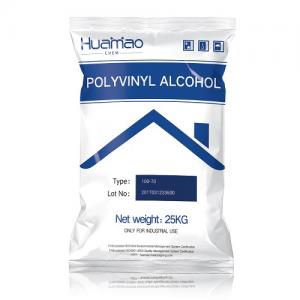
Physical-chemical propertiesGradeHydrolysis, /%Viscosity, /(mPa.s)Volatiles, /%≤Ash, /%≤pHPurity, /%≥088-0587.0-89.04.5-6.05.00.55-793.5098-0598.0-99.05.0-6.55.00.55-793.5098-0898.0-99.09.0-11.05.0...
IntroductionPoly(vinyl alcohol) (PVOH, PVA, or PVAL) is a water-soluble synthetic polymer. It has the idealized formula [CH2CH(OH)]n. It is used in papermaking, textiles, and a variety of coatings. It...
Standard GradesIndividual HUAMAO® polyvinyl alcohol grades vary in molecular weight and degree of hydrolysis. Molecular weight is generally expressed in terms of solution viscosity. The viscositie...
|
Grade |
Hydrolysis, /% |
Viscosity, /(mPa.s) |
Volatiles, /%≤ |
Ash, /%≤ |
pH |
Purity, /%≥ |
|
088-05 |
87.0-89.0 |
4.5-6.0 |
5.0 |
0.5 |
5-7 |
93.5 |
|
098-05 |
98.0-99.0 |
5.0-6.5 |
5.0 |
0.5 |
5-7 |
93.5 |
|
098-08 |
98.0-99.0 |
9.0-11.0 |
5.0 |
0.5 |
5-7 |
93.5 |
|
088-15 |
87.0-89.0 |
15.0-19.0 |
5.0 |
0.35 |
5-7 |
94.0 |
|
098-15 |
98.0-99.3 |
19.0-23.0 |
5.0 |
0.5 |
5-7 |
94.0 |
|
088-20 |
87.0-89.0 |
20.5-24.5 |
5.0 |
0.4 |
5-7 |
93.5 |
|
100-30 |
99.0-100.0 |
27.0-34.0 |
5.0 |
0.5 |
5-7 |
94.0 |
|
088-35 |
87.0-89.0 |
29.0-34.0 |
5.0 |
0.3 |
5-7 |
93.5 |
|
100-50 |
99.0-100.0 |
43.0-53.0 |
5.0 |
0.5 |
5-7 |
94.0 |
|
088-50 |
87.0-89.0 |
45.0-55.0 |
5.0 |
0.3 |
5-7 |
93.5 |
|
100-60 |
99.0-100.0 |
58.0-68.0 |
5.0 |
0.5 |
5-7 |
94.0 |
|
088-60 |
87.0-89.0 |
56.0-68.0 |
5.0 |
0.35 |
5-7 |
94.0 |
|
100-70 |
99.0-100.0 |
68.0-78.0 |
5.0 |
0.7 |
5-7 |
94.0 |
|
100-80 |
99.0-100.0 |
80.0-98.0 |
5.0 |
0.7 |
5-7 |
94.0 |
|
100-40H |
99.0-100.0 |
35.0-45.0 |
6.5 |
2.5 |
7-10 |
86.5 |
|
100-50H |
99.0-100.0 |
45.0-55.0 |
6.5 |
2.5 |
7-10 |
86.5 |
|
Type |
Application |
||||
|
Fiber Processing |
Paper processing |
||||
|
staple yarns |
filament |
Post processing |
surface sizing |
pigment binder |
|
|
100-70 |
|
|
☆ |
|
|
|
Type |
Application |
||||
|
Binders |
Stabilizer |
||||
|
book paper bond |
Re-wet adhesive |
plywood adhesive |
Vinyl Acetate |
suspension polymerization |
|
|
100-70 |
◎ |
◎ |
◎ |
|
|
|
Type |
Application |
|||||
|
Molding materials&Other |
||||||
|
PVB |
Film or sponge, |
soil improvement |
ight-sensitive glue |
medicine or cosmetics |
building materials |
|
|
100-70 |
|
|
|
|
|
|
we will contact you within 24 hours.